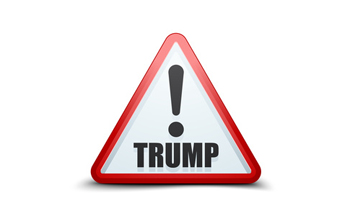Like or hate Donald Trump, the presumptive U.S. Republican Party nominee for president, his positions are consistent with two principles of game theory.

Donald Trump, the game theorist. Image Michael Vadon, CC BY-SA 2.0.
The first is to be unpredictable, leaving an opponent guessing about what one might do. When questioned about whether he would shut down the government to pursue a cause, Trump declined to say, "because I want to show unpredictability." He gave a similarly ambiguous response when queried about whether he would use nuclear weapons to stop terrorists, again reflecting his penchant for unpredictability.
In fact, this is a rational strategy in games in which your best choice, and your opponent's as well, depends on what strategy each of you chooses. Such interdependence of choices makes the selection of a strategy a matter of which side, if either, will commit first, enabling the other side to respond optimally.
But if each side is determined to hold out on its choice, game theory suggests that one should randomise one's choices, not necessarily equally, which prevents an opponent from predicting exactly what you will do. (If your choice is truly random, you will not be able to predict it either, rendering it impossible for your opponent to outguess you.) Leaving your choice to chance — in negotiations, walking away from the table, holding out longer, or offering a compromise settlement — can be both unnerving and effective.
The uncertainty of your choice may force an impatient negotiator to move in your direction. On the other hand, it may sabotage a deal. Appearing to be unpredictable is the essence of Trump's approach to extracting, in difficult negotiations, the most from an opponent.
Paralleling this strategy is Richard Nixon's "madman theory": By credibly appearing to be mad, you strike fear in the heart of an opponent that you might do something dreadful, even at your own expense — such as using nuclear weapons that might escalate to a nuclear exchange — so your opponent will back off from a dire confrontation.
This strategy reflects another principle of game theory. In some games, it is optimal to be anything but ambiguous. Instead, one should take an unequivocal position and force an opponent to respond to it. Trump's proposal to evict millions of Mexicans who are in the United States illegally, and force Mexico to pay for a wall that will keep them out in the future, is a pie-in-the-sky idea, as many have pointed out. It will not happen, even if Trump is elected president.
So what purpose does it serve? It forces people to respond, some with delight and some with outrage. It demonstrates to his supporters his strength, his willingness to take a provocative position, even if it alienates others. Trump's demeaning comments on both his opponents and women also show to many that he is a person to be reckoned with, as evidenced so far by his strong showings in caucuses and primaries.

In effect, Trump is playing a game of chicken, daring those who oppose him to battle him on these issues. Marco Rubio was a candidate who stooped to Trump's level in exchanging sexual taunts and lost badly by undermining his image as an upright moderate.
This is not to say that a party that acts boldly, daring an opponent to respond, will always come out on top. In the 1962 Cuban missile crisis, the Soviet Union tried to counter the nuclear advantage of the United States by installing intermediate and medium-range nuclear missiles in Cuba.
The United States responded with a naval blockade of Cuba, euphemistically called a quarantine, forcing the Soviets to withdraw the missiles. But the "deal" also included a public pledge not to invade Cuba and a secret provision that the United States would remove its missiles from Turkey.
I suggest that much of what Donald Trump offers is ambiguity, which in part stems from his ignorance on policy issues. This stance is anything but a stupid strategy in deal-making. He combines it with confrontation, which works to draw out opponents on a battlefield on which Trump thinks he can win. The latter strategy is dangerous, however, if one is bluffing and the bluff is called.
This may happen to some extent in the remaining campaign, but the danger will subside if Trump is elected president. Then he can back off from his extreme stances by saying, in effect, that he has more important issues to attend to. This is more difficult in the campaign itself, when he is hammered by opponents, but then he can revert to his tactic of claiming to be unpredictable. We will see how he juggles this heady mix of ambiguity and provocation as the campaign progresses — or, in the eyes of his opponents, regresses.
About the author
Steven J. Brams is professor of politics at New York University. He is the author of, among other books, Game Theory and the Humanities: Bridging Two Worlds (MIT Press, 2011).
Comments
Who decides what?
The president does not have the right for deciding everything to do with the US policy, but the impression given by the current state of panicky emotion in the US is that he does. So any game that he chooses to play is associated with his election and the power that it may bring and not about how quickly there will be another world war. Trump, if elected will give the Republicans a run for their money and possible show up how divided they really are, and it will confuse them because of not having a preset policy nor agenda. It will certainly make life interesting, but as the Chinese say, we hope that you will not live through interesting times.